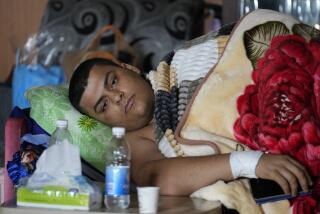Attack on Iraqi provincial government building kills 8
- Share via
Reporting from Baghdad — Gunmen stormed the local council offices in Diyala province Tuesday, killing at least eight people in the latest assault on government buildings in Sunni Muslim parts of Iraq.
The morning attack in the eastern city of Baqubah lasted nearly two hours before army and police personnel took back control of the council building, according to local politicians and security officials. The gun battle, coupled with a U.S. military announcement that two American soldiers were killed Monday in the south, stoked a perception that the country was slipping back into violence.
Iraqi politicians warned that armed groups were taking advantage of a pernicious feud between the leading government blocs of Prime Minister Nouri Maliki, a religious Shiite Muslim, and Iyad Allawi, a secular politician. Last week, those attending a rally sponsored by the government cheered Maliki and waved posters of Allawi with a red X slashed across his face.
“These repeated attacks are showing a continuing decline in the security situation. It should ring the bell, and the government should try to do something but is doing nothing,” said parliament member Mahmoud Othman. “There is no law and order. This country is in a disaster.”
Deputy provincial council chairman Sayed Sadiq Jaafer Abdullah said Tuesday’s attack started about 9:30 a.m. when a car bomb exploded, knocking down the complex’s blast walls and allowing five suicide bombers to storm the council offices. Abdullah said one suicide bomber set off his explosives at the main gate and another was shot dead from a watchtower as he reached the building’s doors. Two more died in a blast from one of the men’s explosives vests, and the fifth was captured.
Abdullah said the council had postponed its regular meeting scheduled Tuesday because it had heard rumors of an attack. He added that U.S. military personnel who had been scheduled to attend the meeting were nearby and helped evacuate the wounded.
The attack, which police said killed eight civilians, mirrored an assault in March on the provincial council building in neighboring Salahuddin province. That gun battle left more than 50 people dead.
Such attacks also have been more common in the western province of Anbar as armed groups have sought to exert their influence once more in Sunni regions that have grown more stable since 2007, when U.S. forces increased their troop numbers in Iraq.
Abdullah warned that armed groups were exploiting the rifts in Baghdad. “The microbes and parasites live if there is a convenient atmosphere for them,” he said.
The attack Tuesday was the gravest sign yet of deteriorating security around central Iraq in the countdown to the withdrawal of U.S. forces later in the year. The lack of stability has left the U.S. military vulnerable to attack, and the Pentagon’s announcement of the two soldiers’ deaths brought new attention to the dangers.
The fatalities raised the number of U.S. soldiers killed in action in Iraq since 2003 to 4,462, according to figures posted on the icasualties.org website. Eight American troops have been killed in action this month after two were killed in all of May.
Assigned to training and assisting Iraqi forces, U.S. soldiers rely on the Iraqi government to guard areas around their bases. But despite the efforts of Iraqi security forces, Shiite and Sunni militia groups seem increasingly able to plan bombing and rocket attacks.
Last week, five U.S. soldiers serving as advisors at an Iraqi national police base in eastern Baghdad were killed in a rocket attack. An Iraqi Shiite group that calls itself Hezbollah, a name it shares with the Lebanese militant organization, later claimed responsibility for the incident, in which there were no Iraqi casualties.
Two days later, a U.S. soldier was killed in a bomb attack in the Shiite-dominated province of Najaf, regarded as the calmest area in southern Iraq.
Salman is a Times staff writer.
More to Read
Sign up for Essential California
The most important California stories and recommendations in your inbox every morning.
You may occasionally receive promotional content from the Los Angeles Times.










